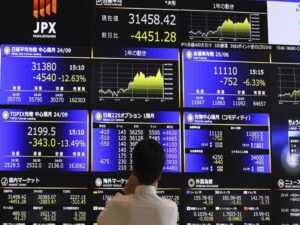Entertainment stocks surge as South Korea and China move to restore cultural ties after a years-long freeze.
After nearly a decade of restrictions, K-pop may finally be making its long-awaited return to China. The breakthrough comes after South Korea’s national broadcaster KBS signed a major media exchange and cooperation agreement with China Media Group (CMG) — a state-run media conglomerate that includes China Central Television and operates under the Chinese Communist Party.
The agreement, signed in Seoul on Saturday, aims to promote content collaboration across news, sports, and culture — including the Chinese launch of KBS’s popular Music Bank World Tour, which features top K-pop artists.
KBS President Park Jang-beom described the partnership as “a breakthrough that will allow the entire Korean content industry to once again make a full-fledged foray into the Chinese market.”
K-pop Stocks Surge on Breakthrough Announcement
The news immediately sent South Korean entertainment shares soaring. SM Entertainment jumped as much as 8.11%, JYP Entertainment gained over 9.39%, and YG Entertainment and Hybe rose around 4% and 3% respectively before paring some gains later in the day.
Analysts say investor optimism stems from the potential reopening of a massive market that has been largely closed since 2016, when China imposed a “soft ban” on Korean entertainment following Seoul’s deployment of the U.S. THAAD anti-missile system.
High-Level Diplomacy and Cultural Symbolism
The announcement coincided with a renewed thaw in political ties. During the Asia-Pacific Economic Cooperation (APEC) summit, South Korean President Lee Jae Myung met with Chinese President Xi Jinping — a meeting Lee described as “very significant” in fully restoring Korea–China relations.
Adding to the symbolism, JYP founder Park Jin-young attended a state dinner with Xi and Lee. In a photo posted on Instagram, Park was seen in conversation with the two leaders. South Korean lawmaker Kim Yong Bae later revealed that during the dinner, Park proposed a large-scale concert in Beijing, to which Xi reportedly responded by summoning Foreign Minister Wang Yi and giving instructions to move forward.
“I anticipate that this will be a moment that goes beyond the lifting of the ban on Korean culture and opens the door to full-scale advancement into Korea,” Kim wrote on Facebook.
SM and JYP Lead the Rally
Oh Jiwoo, a research analyst at CGS International Securities Hong Kong’s Korea branch, explained that SM Entertainment’s sharp rise reflects its strong historical ties to the Chinese market — including Tencent’s role as its second-largest shareholder. Earlier this year, SM subsidiary DearU also partnered with Tencent Music Entertainment to launch its Bubble messaging service in China.
Meanwhile, JYP’s gains were bolstered by Park Jin-young’s direct engagement with Xi, underscoring the company’s deep diplomatic and cultural connections.
KBS confirmed that further cooperation discussions with CMG will continue at next year’s APEC Summit in Shenzhen. Local media reports also suggest that the new partnership could revive the “Korea-China Song Festival,” a cultural event that ran from 1999 to 2016 and once featured Xi’s wife, Peng Liyuan, as a performer.
“In my view, I think it’s still a positive sign that culture cooperation is starting to pick up again,” said Oh Jiwoo. “And when it comes to [the] KBS and CMG agreement, I think it’s also a very meaningful step toward normalizing K-pop activities in China.”
A Market Still Hungry for K-pop
Despite the 2016 restrictions, demand for K-pop in China never truly disappeared. According to a July report from the Korea Creative Content Agency, mainland China, Hong Kong, and Taiwan together accounted for 26.1% of South Korea’s music exports in 2023, worth about $319.58 million. Japan remained the top market with 35.1% of exports, valued at $429.08 million.
The 2025 Overseas Hallyu Survey by South Korea’s Korea Foundation for International Cultural Exchange found that Chinese favorability toward South Korea stood at 73.5%, higher than the global average. It also noted that interest in Korean culture remains strong despite past restrictions.
“Chinese consumers’ interest in and consumption of Korean cultural content continues to grow,” the survey said. “There is significant potential for Korean content to exert even greater economic and cultural influence in the future.”
Investor Outlook: Anticipation Builds
Analysts at Morgan Stanley had already flagged K-pop stocks earlier this year, citing investor hopes that China would reopen its market to Korean performers. With this new media deal, those expectations appear closer to reality than ever.
If the partnership leads to a formal lifting of the cultural ban, it could mark one of the most significant comebacks in global entertainment trade — reuniting two of Asia’s biggest pop culture powerhouses and potentially reshaping the landscape of K-pop’s next global chapter.






